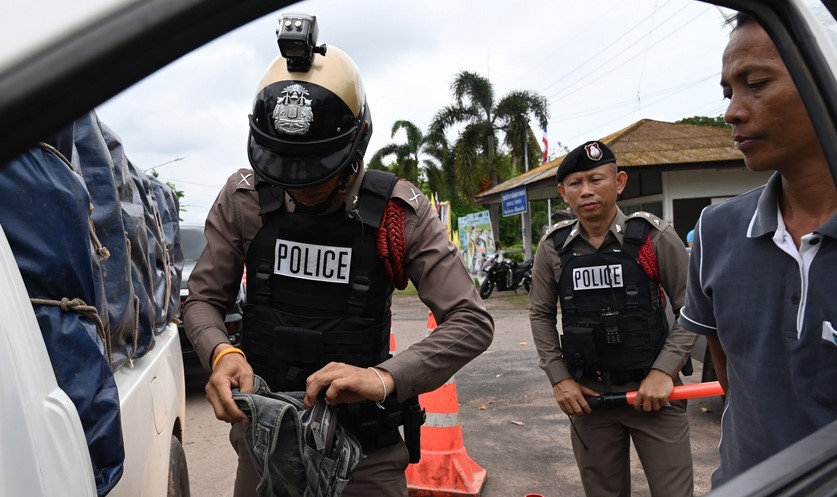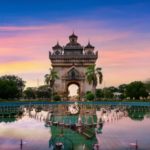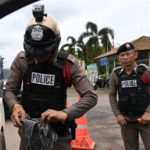
In the middle of the night, the Royal Thai Police came for Sirichai “New” Nathuang, a student at Thammasat University’s Rangsit Campus. Accused of lèse majesté or defaming the Thai monarchy for spray painting political messages on the portraits of three members of the Royal Family, he was then charged with a cybercrime charge later for refusing to surrender his computer password to authorities. Sirichai is one of over 40 people that have been accused of lèse majesté, since Thai Prime Minister Prayut Chan-o-cha began using it as a political weapon against political protesters.
Several people were arrested over the weekend as pockets of pro-democracy protesters defied the emergency law imposed during the recent COVID-19 outbreak to rally against Article 112 charges being directed at them. While the Ratsadon group have paused large-scale activities in light of the recent COVID-19 outbreak, some have used flash mobs and creative stunts to bring attention to lèse majesté usage nationally and internationally. The violence on display at Victory Monument is a sign that the police are willing to escalate their tactics toward protesters and the possibility that protests might not always remain peaceful, as Thai police chief Suwat Jangyodsuk warned that his officers would “use force if necessary.”

With Article 112 being employed so often, the use of the Royal Thai Police to implement the will of the Prayut-led government is extremely concerning. Over the past few decades, the police have become the main instrument for whomever has power, with senior leadership echoing the same nationalist and pro-institution rhetoric employed by past governments. Gone seem to be the days of the so-called “tomato police”, officers who had divided loyalties and sympathies. After the May 2014 coup, the police have worked in close collaboration with the National Council for Peace and Order (NCPO) to silence regime critics and now have used harsh tactics to disperse protesters championing monarchical reforms.
The Royal Thai Police have become instruments of both the military and Thailand’s conservative establishment. The Volunteer Spirit 904 training, which incorporated military-style discipline over as long as six weeks, drilled into participants a glorified, nationalistic version of Thai history focused on the work of the country’s past monarchs. Graduates were then tasked with promoting the monarchy and progress was tracked through messaging applications. As many as 3,000 have cycled through the military-style camp since it began in 2018.
Thai police chiefs of the past have also made defending the institution as their top priority. In 2010, Police General Wichean Potephosree wanted to adopt a “zero-tolerance” policy toward those that would break section 112 of the criminal code, a challenge to those associated with former Prime Minister Thaksin Shinawatra, including Red Shirt protesters. Wichean was later instrumental in helping dismantle Red Shirt-affiliated radio stations and communications. In one instance, authorities closed 13 stations for airing a live speech by UDD protest leader Jatuporn Prompan, which was deemed to have violated the country’s lese majeste laws.
When Chakthip Chaijinda succeeded Somyot Pumpunmuang as chief of the Royal Thai Police in August 2015, the number of lèse majesté-related investigations spiked. In the period of mourning after the death of King Bhumibol Adulyadej, King Bhumibol Adulyadej, Chakthip pursued investigations of dozens of individuals suspected of defaming the monarchy and threatened to pay the airfare for potential offenders to leave Thailand, noting “I’m willing to go into debt for the country from paying these people to leave the country.” The October 2016 period was also an ugly period, where numerous cases of suspicion of lèse majesté pitted royalist mobs against unsuspecting shopkeepers. Chakthip has now been appointed to a position inside the palace, along with royalist former Royal Thai Army Chief General Apirat Kongsompong.
The question now is what to make of this long sequence of events. While the Royal Thai Police have a history serving whatever master that assumes the mantle of leadership, does recent history reveal a police force much more willing to those advocating for reform of the institution and fighting for change? What is clear is that without substantive changes at the top, the Royal Thai Police will continue to be a blunt instrument of the state.






